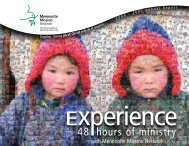<strong>Mission</strong> insightYou can’t do mission without inclusionBy Wil LaVeistrecent opinion piece in The <strong>Mennonite</strong>A titled, “Confessions of a white antiracist,”gripped my attention. The commentaryby Sarah Shirk is about her initially coldreaction to the changed worship style at theadult services during the annual <strong>Mennonite</strong> Church USAConvention in July. Shirk wrote honestly about how she wasrattled and disappointed by the missing four-part harmonyhymns she and other white friends had anticipated. Instead,the predominantly black Calvary Community Church bandof Hampton, Va., led worship with contemporary guitars,syncopated drums, and keyboards blended with soulfulvoices singing unfamiliar gospel tunes.“I didn’t know the songs the worship band led. I missedthe hymns I had grown up singing and come to love,”Shirk wrote.But as the week went on, something happened.“I noticed a middle-aged black woman standing a fewrows ahead of me. She had her head tilted back, faceraised, and was swaying and clapping along with themusic. I wondered how many conventions and how manychurch services she had previously sat through, feeling asI now did—disconnected and a bit out of my element.But today it was her turn to worship in a style familiarand nurturing to her. So this music is <strong>Mennonite</strong> music.”As a black American and member of Calvary attendingmy first <strong>Mennonite</strong> convention, I was proud that God hadused my church to be such a bridge to understanding. ButI was even more intrigued by the reactions posted at thebottom of Shirk’s column, particularly those ripping herpoint of view.Jono11 posted:“…You don’t walk into an Amish service and demandthat they stop singing the way they sing, or that they startdriving SUVs and watching satellite TV... And you don’tjoin the <strong>Mennonite</strong> Church just to change the way we worship,change the way we sing, and ultimately transform usfrom a vital, unique peace church into just another blandvanilla-Christian nothingness.”Hmmm. I respect Jono11’s valid point, which is sharedby many <strong>Mennonite</strong>s, I thought to myself. I wouldn’t wantsomeone to attend Calvary and insist the flava be dilutedfrom the worship music.I get it because I, too, believe that my unique blackAmerican cultural context is as equally relevant, valuableand godly as the European. The same is true forthe Asian, Middle-Eastern, African, South American andNative American.Anyone who understands the history of persecutionthat European <strong>Mennonite</strong>s suffered over generations thatforced them to North and South America, and how thathas deeply shaped the church we appreciate today, shouldunderstand the need to preserve this great heritage, right?Is the distinctive European-inspired singing style as mucha pillar of what makes <strong>Mennonite</strong>s unique and attractiveas our emphasis on peace, justice and missions?Ironically, therein lies the angst and the answer.Working as a staff member in the marketing departmentof <strong>Mennonite</strong> <strong>Mission</strong> <strong>Network</strong>, it has become clear tome that you can’t truly believe in missions without alsobelieving in cultural inclusion. If you serve and witnessto someone outside of your culture, as Jesus has clearlycommissioned Christians to do in commanding that we“therefore, go and make disciples of all nations,” a naturalresult is that the people we lead to Christ would want tojoin us in worship at church. This has been my personalexperience over the years and has been the experience ofmany mission workers I’ve been honored to write aboutrecently. So, it must also follow that through missions, Godis bringing about the “house of prayer for all nations,”and through our individual and collective spiritual growth,God’s will is being “done on earth as it is in heaven.”Inclusion is God’s intended consequence.What Sister Shirk shared was that in experiencing what itis like to be a cultural fish out of water at church, and allowingthe Holy Spirit to lead her beyond her initial discomfortzone, she grew another level closer to heaven. If we focuson the superior Spirit that unites us, we’ll find there is morethan enough room at the table for us to sample, appreciateand value each other’s equally godly styles.Personally, one of the most beautiful moments of theadult worship experience at the convention was whenwe took communion together and sang hymns in unity.<strong>Our</strong> blended voices sounded angelic, especially mine as Itucked it below the voice of the white brother next to mewho could really sing.Praise God for him.Wil LaVeist is managing editor for multimedia at <strong>Mission</strong> <strong>Network</strong>.14 n October 2011
<strong>Mennonite</strong> Church USANot a sage on the stage,but a guide from the sideBy Ervin StutzmanThis issue of Beyond <strong>Our</strong>selves featuresworker blogs. It’s a helpful way to geta perspective from the field. In June, I hada similar opportunity when I met with asmall group of mission executives who wereinterviewing three veteran <strong>Mennonite</strong> <strong>Mission</strong> <strong>Network</strong>workers in the Argentine Chaco—Willis and ByrdaleneHorst and Keith Kingsley. They shared about the dramaticshift in mission strategy and practice they had experiencedamong the indigenous people of South America. In keepingwith the long-time mission workers who had precededthem, they paid particular attention to the ways that theycould support the work that God was doing among theIndians of the Chaco. Rather than seeing themselves as asage on the stage with authoritative answers, they committedthemselves to being a guide on the side, learningfrom the Scriptures alongside the indigenous people. Theylearned to read the Bible in an intercultural way, exploringthe meaning of Scripture as understood through a differentcultural lens.This idea, of course, is as old as Christianity itself. Theearly Christians (re)interpreted the Hebrew Scripturesin light of the coming of Jesus Christ. The Apostle Paullearned to read the Scriptures alongside the Gentiles inAsia and Europe who embraced the way of Jesus.The Horsts and Kingsleys learned to listen for thevoice of the Spirit as the Scriptures were read aloud to theToba people. They sat in a circle with the people, discerningtogether with them the meaning of Scripture for theirlives. Whereas this was once called cross-cultural work,they prefer to call it intercultural work. The missionworkers are not simply bringing insights and teachingfrom their own culture and background; they are receivinginsights from those who are hearing the Scripturesin their own language for the first time.As I interacted with these veteran communicators ofthe gospel, I thought about the priority of <strong>Mennonite</strong>Church USA that we call intercultural transformation.Like the mission workers from Argentina, we must learnto sit in circles with people from other cultures, listeningfor the Spirit of God in our midst.Ervin Stutzman is executive director of <strong>Mennonite</strong> Church USA.New service workers, continued from page 13SOOPErma Edwards,Oskaloosa, Iowa, servedone month in Elkhart, Ind.Florence and VernardGuengerich, Goshen,Ind., served two weeksin Macon, Miss.Marilyn and PeterHartman, Hesston,Kan., served two monthsin Lincoln City, Ore.Anne and BruceHummel, Millersburg,Ohio, served one weekin San Antonio.Jennifer and RobertKoehn, Cordell, Okla.,served one week in SanAntonio.Elizabeth and RonaldMartin, Wooster, Ohio,served one week in SanAntonio.Dave and KarenMast, Ephrata, Pa.,served three months inEphrata, Pa.J. Kevin and LoreneMiller, Goshen, Ind.,served one week inMacon, Miss.Frank and HelenNachtigal, NorthNewton, Kan.,served one month inShipshewana, Ind.Fannie Schlabach,Middlebury, Ind., servedone week in Meridian,Miss.George B. and MaeStoltzfus, Landisville,Pa., served one month inHickory, N.C.Cindy and Tom Yoder,Goshen, Ind., served oneweek in Macon, Miss.Elaine Yoder, Middlebury,Ind., served one week inMeridian, Miss.YouthVentureLaura Alderfer,Sellersville, Pa., served inGuatemala.Leah Amstutz, Goshen,Ind., served in Botswana.Nicole Bartel,Hillsboro, Kan., served inLos Angeles.Lacey Brinegar, Paoli,Ind., served in Botswana.Katelyn Derstine,Sellersville, Pa., served inGuatemala.Isabella Gomez, LosFresnos, Texas, served inLos Angeles.Lydia Good, Souderton,Pa., served in Guatemala.Chaz Graber, Topeka,Kan., served in LosAngeles.Hannah and JustinHeinzekehr, Claremont,Calif., served in LosAngeles.Annaka Miller,Hanston, Kan., served inSanta Cruz, Bolivia.Elisabeth Miller,Laramie, Wyo., served inSanta Cruz, Bolivia.Laura Pound, Fresno,Calif., served in SantaCruz, Bolivia.Jill Schmidt,Whitewater, Kan., servedin Santa Cruz, Bolivia.Elizabeth Schrag,Galva, Kan., served inPhoenix.Kendra Scott, Newton,Kan., served in LosAngeles.Lynford Seibel,Lawrence, Miss., servedin Santa Cruz, Bolivia.Justin Shenk,Lancaster, Pa., served inGuatemala and Phoenix.Valerie Showalter,Lancaster, Pa., served inGuatemala and Phoenix.Immanuel Sila,Denver, Colo., served inBotswana.Vanessa Silverman,Miami, Fla., served inBotswana.Marissa Souder,Souderton, Pa., served inGuatemala.Kaitlyn Terry,Federalsburg, Md.,served in Santa Cruz,Bolivia.Braden Unruh,Canton, Kan., served inPhoenix.InternationalKatrina Bechtholdbegan a one-year assignmentteaching Englishfor the Korea AnabaptistCenter in Seoul, SouthKorea. She is fromGreentown, Pa., and amember of Lords ValleyCommunity Church.Lois and Tom Harderserved two months asfraternal musicians inParaguay. They are fromWichita, Kan., and aremembers of LorraineAvenue <strong>Mennonite</strong>Church.Sydney McCullybegan a one-yearassignment teachingEnglish for the KoreaAnabaptist Center inSeoul, South Korea. Sheis from Wylie, Texas, andattends Lords ValleyCommunity Church inGreentown, Pa.Brian and JessicaReece began a oneyearassignment teachingEnglish for the KoreaAnabaptist Center inSeoul, South Korea.They are from StateCollege, Pa., and aremembers of University<strong>Mennonite</strong> Church.Donald and MarieGaeddert have beguna two-year assignmentteaching English in Chinawith <strong>Mennonite</strong> Partnersin China. They are fromLarned, Kan., and aremembers at Bergthal<strong>Mennonite</strong> Church.Beyond<strong>Our</strong>selves.<strong>Mennonite</strong><strong>Mission</strong>.net ■ 15




